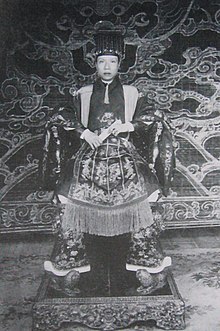Khải Định
| Khải Định 啟定 |
|||||||||||||||||
|---|---|---|---|---|---|---|---|---|---|---|---|---|---|---|---|---|---|
 |
|||||||||||||||||
| Emperor of Vietnam | |||||||||||||||||
| Reign | 18 May 1916 – 6 November 1925 | ||||||||||||||||
| Predecessor | Duy Tân | ||||||||||||||||
| Successor | Bảo Đại | ||||||||||||||||
| Born | 8 October 1885 | ||||||||||||||||
| Died | 6 November 1925 (aged 40) | ||||||||||||||||
| Burial | Ứng Lăng | ||||||||||||||||
| Spouse | Imperial Noble Consort Trương Như Thị Tịnh Noble Consort of First Rank, Ân phi Hồ Thị Chỉ Hoàng Thị Cúc, Empress Mother Đoan Huy |
||||||||||||||||
| Issue | Bảo Đại | ||||||||||||||||
|
|||||||||||||||||
| Father | Emperor Đồng Khánh | ||||||||||||||||
| Mother | Empress Hựu Thiên | ||||||||||||||||
| Signature |  |
||||||||||||||||
| Full name | |
|---|---|
| Nguyễn Phúc Bửu Đảo Nguyễn Phúc Tuấn |
|
| Era name and dates | |
| Khải Định: 1916–1925 | |
| Posthumous name | |
| Tự Thiên Gia Vận Thánh Minh Thần Trí Nhân Hiếu Thành Kính Di Mô Thừa Liệt Tuyên Hoàng Đế 嗣天嘉運聖明神智仁孝誠敬貽謨承烈宣皇帝 |
|
| Temple name | |
| Hoằng Tông (弘宗) |
| Khải Định | |
| Vietnamese name | |
|---|---|
| Vietnamese | Khải Định |
| Hán-Nôm | |
| Birth name |
Khải Định (Vietnamese: [xa᷉ːj ɗîŋˀ]; Chinese: 啟定; born Nguyễn Phúc Bửu Đảo; 8 October 1885 – 6 November 1925) was the 12th Emperor of the Nguyễn Dynasty in Vietnam, reigning from 1916 to 1925. His name at birth was Prince Nguyễn Phúc Bửu Đảo. He was the son of Emperor Đồng Khánh, but he did not succeed him immediately.
After Emperor Đồng Khánh's era came the eras of Emperor Thành Thái and Emperor Duy Tân, both of whom were exiled by the French for their resistance to the colonial regime. After this trouble, the French decided to enthrone Bửu Đảo as he was the son of the monarch who was the most submissive Nguyễn collaborator with the colonial regime, standing with the French colonizers and opposing any independence movements, Emperor Đồng Khánh.
Nguyễn Phúc Bửu Đảo became the nominal ruler of Annam on 18 May 1916, after the exile of Duy Tân (Nguyễn Phúc Vĩnh San) and took the name Khải Định for his reign, meaning "auger of peace and stability." He said he wanted to restore the prestige of the empire, but this was not possible with his close collaboration with the French occupiers. Although not satisfied with his position, Khải Định enacted a policy of close collaboration with the French government and was effectively a puppet political figurehead for the French colonial rulers, following all of their instructions to give "legitimacy" to French policies.
Because of this, Khải Định was very unpopular with the Vietnamese people. The nationalist leader Phan Châu Trinh accused him of selling out his country to the French and living in imperial luxury while the people were exploited by France. Nguyễn Ái Quốc (later known as Hồ Chí Minh) wrote a play about Khải Định called "The Bamboo Dragon" that ridiculed him as being all grand appearance and ceremony but a powerless puppet of the French government.
...
Wikipedia
